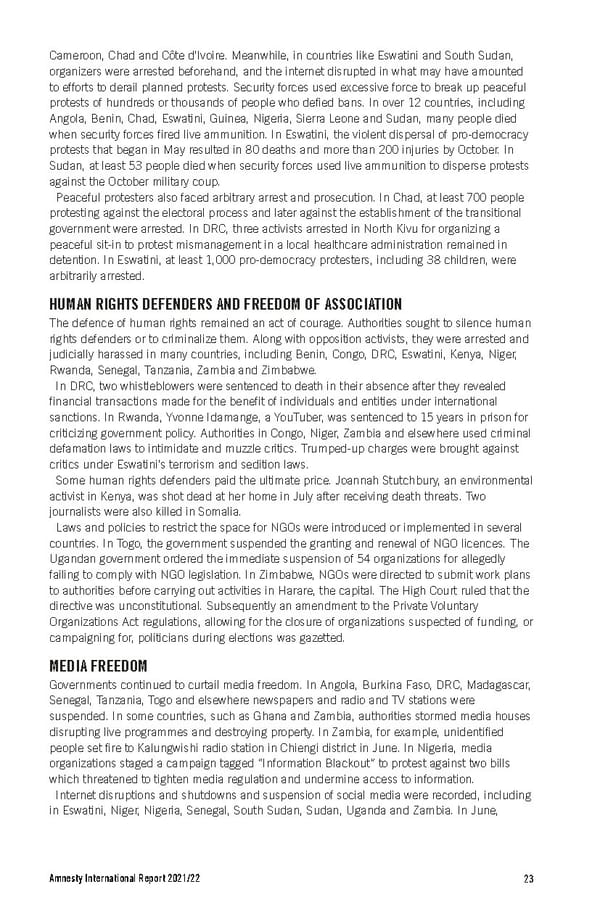Cameroon, Chad and Côte d’Ivoire. Meanwhile, in countries like Eswatini and South Sudan, organizers were arrested beforehand, and the internet disrupted in what may have amounted to efforts to derail planned protests. Security forces used excessive force to break up peaceful protests of hundreds or thousands of people who defied bans. In over 12 countries, including Angola, Benin, Chad, Eswatini, Guinea, Nigeria, Sierra Leone and Sudan, many people died when security forces fired live ammunition. In Eswatini, the violent dispersal of pro-democracy protests that began in May resulted in 80 deaths and more than 200 injuries by October. In Sudan, at least 53 people died when security forces used live ammunition to disperse protests against the October military coup. Peaceful protesters also faced arbitrary arrest and prosecution. In Chad, at least 700 people protesting against the electoral process and later against the establishment of the transitional government were arrested. In DRC, three activists arrested in North Kivu for organizing a peaceful sit-in to protest mismanagement in a local healthcare administration remained in detention. In Eswatini, at least 1,000 pro-democracy protesters, including 38 children, were arbitrarily arrested. HUMAN RIGHTS DEFENDERS AND FREEDOM OF ASSOCIATION The defence of human rights remained an act of courage. Authorities sought to silence human rights defenders or to criminalize them. Along with opposition activists, they were arrested and judicially harassed in many countries, including Benin, Congo, DRC, Eswatini, Kenya, Niger, Rwanda, Senegal, Tanzania, Zambia and Zimbabwe. In DRC, two whistleblowers were sentenced to death in their absence after they revealed financial transactions made for the benefit of individuals and entities under international sanctions. In Rwanda, Yvonne Idamange, a YouTuber, was sentenced to 15 years in prison for criticizing government policy. Authorities in Congo, Niger, Zambia and elsewhere used criminal defamation laws to intimidate and muzzle critics. Trumped-up charges were brought against critics under Eswatini’s terrorism and sedition laws. Some human rights defenders paid the ultimate price. Joannah Stutchbury, an environmental activist in Kenya, was shot dead at her home in July after receiving death threats. Two journalists were also killed in Somalia. Laws and policies to restrict the space for NGOs were introduced or implemented in several countries. In Togo, the government suspended the granting and renewal of NGO licences. The Ugandan government ordered the immediate suspension of 54 organizations for allegedly failing to comply with NGO legislation. In Zimbabwe, NGOs were directed to submit work plans to authorities before carrying out activities in Harare, the capital. The High Court ruled that the directive was unconstitutional. Subsequently an amendment to the Private Voluntary Organizations Act regulations, allowing for the closure of organizations suspected of funding, or campaigning for, politicians during elections was gazetted. MEDIA FREEDOM Governments continued to curtail media freedom. In Angola, Burkina Faso, DRC, Madagascar, Senegal, Tanzania, Togo and elsewhere newspapers and radio and TV stations were suspended. In some countries, such as Ghana and Zambia, authorities stormed media houses disrupting live programmes and destroying property. In Zambia, for example, unidentified people set fire to Kalungwishi radio station in Chiengi district in June. In Nigeria, media organizations staged a campaign tagged “Information Blackout” to protest against two bills which threatened to tighten media regulation and undermine access to information. Internet disruptions and shutdowns and suspension of social media were recorded, including in Eswatini, Niger, Nigeria, Senegal, South Sudan, Sudan, Uganda and Zambia. In June, Amnesty International Report 2021/22 23
 Amnesty International Report 2021/22 Page 22 Page 24
Amnesty International Report 2021/22 Page 22 Page 24